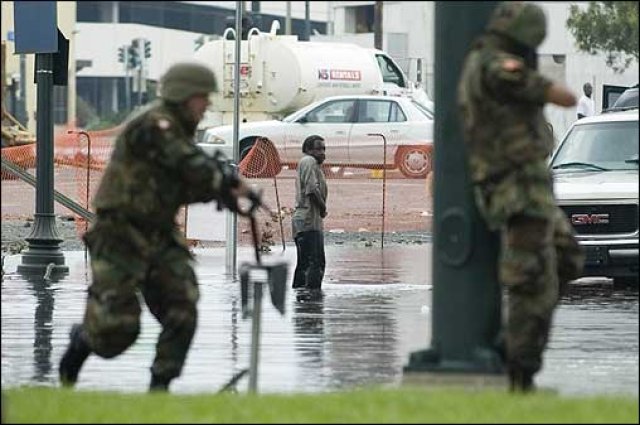
It’s all over the news: images of police in military gear pointing war zone weapons at unarmed Black people with their hands in the air. These scenes made my heart race in an all-too-familiar way.
I was devastated for Mike Brown ― the unarmed Black teenager shot dead by police on August 9 ― his family and the people of Ferguson. Almost immediately, I closed my eyes and remembered the same fear for my own family that pangs many times over a given year.
In the wake of the climate disaster that was Hurricane Katrina almost 10 years ago, I saw the same images of police, pointing war-zone weapons at unarmed black people with their hands in the air. In the name of “restoring order”, my family and their community were demonised as “looters” and “dangerous.”
When a crisis hits, the underlying racism in our society comes to the surface in very clear ways. Climate change is bringing nothing if not clarity to the persistent and overlapping crises of our time.
To me, the connection between militarised state violence, racism, and climate change was common-sense and intuitive. This is, in part, the result of my experience of growing up Black in America, and growing up in New Mexico, a place ravaged by climate impacts.
New Mexico is showing the early signs of what sparked the Cochabamba Water Wars in Bolivia at the turn of the century ― yet another example of how oppression and extreme weather combine to “incite” militarised violence.
The problems of Cochabamba and Katrina are not just about the hurricane or the drought ― it’s what happened after.
It is the institutional neglect of vulnerable communities in crisis, the criminalisation of our people met with state violence and the ongoing displacement of New Orleans’ black residents through the demolition of affordable housing for high-rise condos. This all adds up to corporations exploiting our tragedy using the tools of racism, division, and dehumanisation.
The imposed divisions prevent us from building the movement we need to create a new future for ourselves ― a future where we have clean energy that doesn’t kill us, and creates jobs that provide dignity and a living.
In the wake of Hurricane Katrina,Black and brown people were seen as “disposable” and the powers-that-be sought to divide us by once again painting the victims and heroes as villains.
A discourse that dehumanises and blames the victims makes black and brown communities even more vulnerable than they already are in the wake of climate disasters.
If extreme weather is about droughts, floods, hurricanes, and wildfires, the way people get treated in the wake of disaster is about power. Demonisation allows mainstream US to feel unaffected and disconnected to the employment of unacceptable militarised violence.
We’re all impacted by climate change, but we’re not all impacted equally. Communities of colour and poor communities are hit hardest by fossil fuel extraction, as well as neglected by the state in the wake of crisis. People of colour also disproportionately live in climate-vulnerable areas.
Similarly, state violence should concern us all, but the experience of young Black men in particular in this country is unique. Those of us who are not young Black men must step up to the challenge of understanding that we will likely never experience that level of demonisation.
That kind of solidarity is what it takes to build real people power ― the kind of power that stands up unflinchingly to injustice, and helps us all win our battles by standing together.
This is difficult work. Part of that work involves climate organisers acknowledging and understanding that our fight is not simply with the carbon in the sky, but with the powers on the ground.
[Abridged from 350.org. Deidre Smith is a 350.org strategic partnership coordinator.]
Like the article? Subscribe to Green Left now! You can also like us on Facebook and follow us on Twitter.